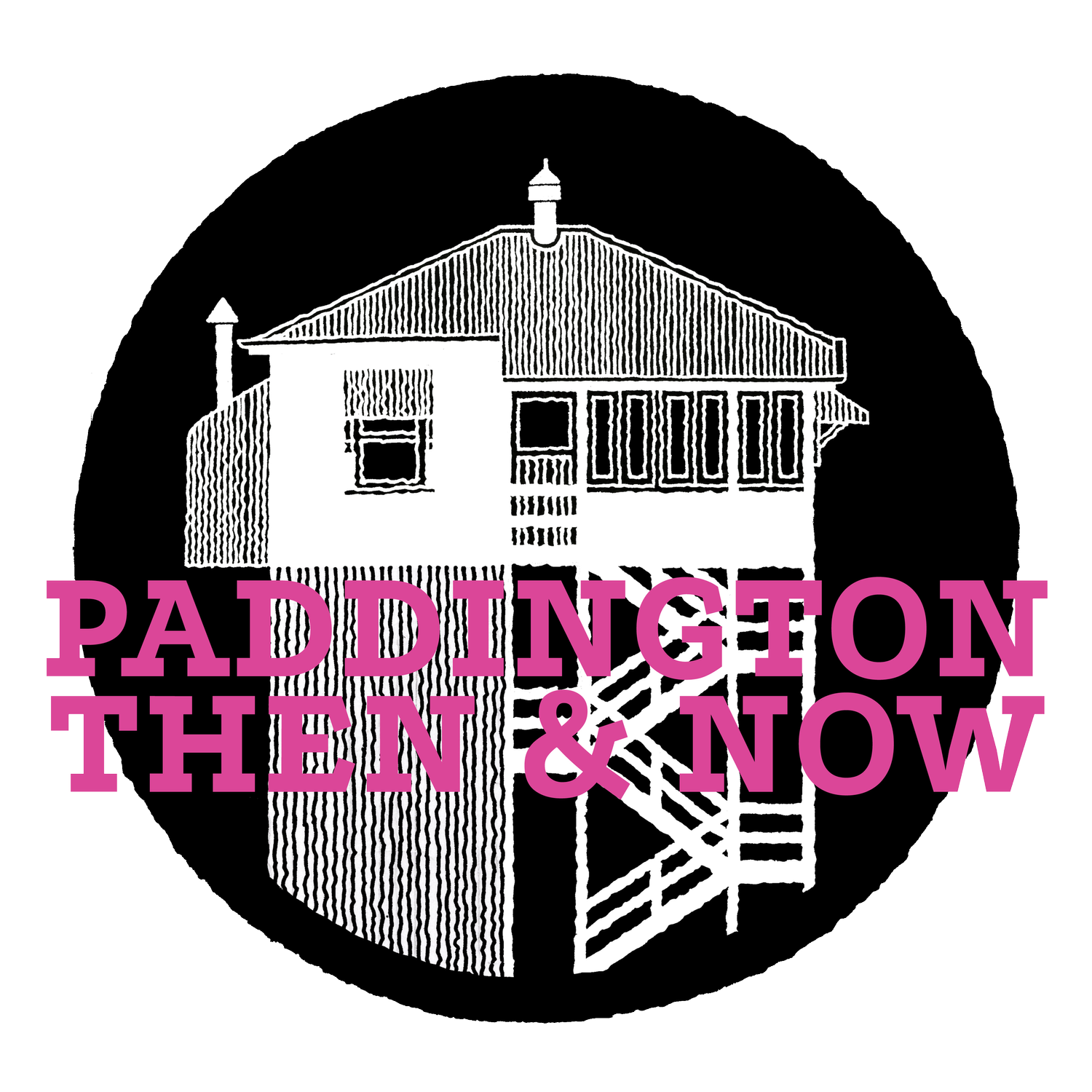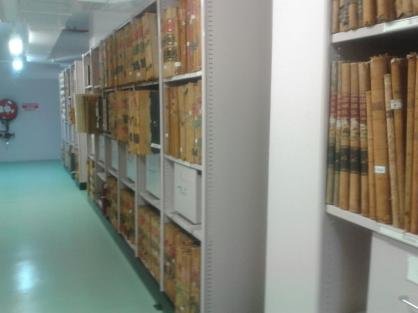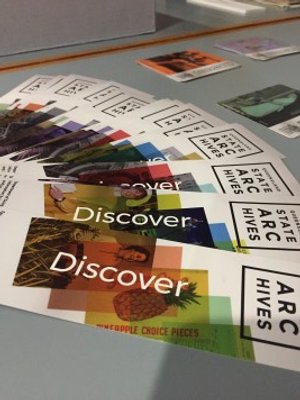The Qld State Archives…
Discovering the dark and dusty backrooms of Queensland’s history has provided many people with answers to their own personal questions, as well as a clearer view of how their Cities and States have developed, but not everybody knows what facilities and resources are available for them to begin their research.
One of the joys of working with the Under the Lino Project, and the Paddington Then and Now Project, has been learning how to research again. Being so fascinated with people, places and events has helped us to revel in the acquisition of new knowledge, found via members of our community and visits to the local repositories of forgotten information.
We have spent many hours in Runcorn at the Queensland State Archives, being taught more about using the facility to further our research, and then doing said research! We also got the opportunity to sticky-beak out the back, where all the documents are held.
The Qld State Archives is the place where they hold documents of permanent value from over 500 Government Agencies dating from as far back as 1824, when the local area was first mapped out by John Oxley just before Governor Brisbane arrived. Most of the items stem from 1859, however, when Queensland was established as a new colony with its own constitution, and they include: paper documents, photographs, audio-visual records, maps, plans and drawings.
Entering the grounds felt a little like we were driving into one of the USA’s forbidden zones, with a long drive through bushland towards a stark and imposing building. We even drove past a three million litre water tank, hidden amongst the trees, used to cool the facility, and in case of fire.
Front Entrance of Qld State Archives… a little like Area 51!
Once inside the main building, we were given strict instructions to leave everything but our clothes in lockers, including phones, cameras and writing implements. We would rather have left our clothes to be honest, because we wanted to write everything down and take lots and lots of photos – hugely frustrating to have to depend on our memory – but the protocol is there to protect the items, and visitors must respect and adhere to their regulations.
The tour took us through a few of the many repositories holding a hundred miles of documents, all neatly stored in adjustable compacti. The first thing to hit me as we walked into the first repository was the smell. It was like being in a medieval library with fluorescent lighting, and the true book lovers in the group took deep breaths to soak up as much of the scent as we could, travelling back through time with the experience.
Compactus hold all 100 miles of State Government documents from 500 agencies
The facility is heavily protected against fire, water damage, humidity and temperature changes and theft. Nothin’ is gettin’ in without permission, we can tell you now! The staff are incredibly strict and highly protective, as well they should be. The documents inside are fragile and important, so everything is done to keep them intact for future generations.
The staff showed us what happens to documents (at the end of the tour when we were allowed our cameras back) when undesirable elements come in contact with them… like water, acidic ink and vermin. Looking at the ruined manuscripts was heart-breaking.
Staff from QSA talking us through how papers get damaged over the years
Termites have ravaged this book
Moisture and mould have attacked this manuscript
In the ‘How to use the State Archives’ seminar, we learned how to use the facility for our own benefit. Obviously, they want to keep the documents safe, but what’s the use of holding all of these items if nobody ever gets to see them? I, personally, could happily lock myself in for the next 20 years just to pore through all of those beautiful documents.
The most useful records the State Archives hold are
Passenger lists for Government-assisted migrants
Wills and intestacies
Inquests
School admissions registers
Court records
Some Moreton Bay penal records
You can go online or in person to the Queensland State Archives to discover information pertaining to the following…
Family history: Discover more about your family history by viewing our courts, government departments and school records.
Immigration: Find lists of immigrant ships and their passengers travelling directly to Queensland from Europe from 1848 onwards.
Schools, hospitals and orphanages: Find nineteenth and early to mid-twentieth century records on Queensland’s government schools, hospitals, orphanages, children’s homes and asylums.
Courts: Find court records of wills, inquests, insolvencies murders and criminal depositions from the mid-nineteenth century onwards.
Government: Read more about Cabinet, Executive Council processes and the activities of the Queensland government from the mid-nineteenth century onwards.
Lands and mining: Find maps, land orders, land sales and mining records from the mid-nineteenth century onwards.
Convicts and early settlers: Find more information on early settlers pre- and post-separation from NSW in 1859, as well as convict records for Moreton Bay, St Helena and Toowoomba.
Aboriginal and Torres Strait Islander peoples: Find archival records on Aboriginal and Torres Strait Islander peoples, including information about individuals, family and community links and native title determination.
Australian South Sea Islanders: Find records from when the first South Sea Islanders arrived in Queensland in 1863 to work in the cotton fields and sugar plantations.
War: Find records on Government activities during the Boer war, First World War and Second World War.
Shipping and railways: Find records on seamen, immigration and the administration of railways in Queensland.
Business: Find more information on businesses and companies that are no longer in existence, including companies, shareholders, and the date of registration and liquidation.
The QSA Online Search Facility is easy to navigate, and if you get stuck, you can always get in touch with the helpful staff using their Contact Details. Searching and reading documents (in their reading room) is free, but there may be fees involved in copying items. If you plan to go out to Runcorn and use their On-site Facilities, it’s helpful to get in touch with them a few days beforehand to let them have the documents ready for you where you arrive, as it takes some time for them to source what you’re after.
Before you visit, it’s important to…
Do as much homework as you can – collate names, dates and geographical locations
Gather family stories and recollections
Visit the Queensland Registry of Births, Deaths and Marriages (& Divorces) (or as Lyn amusingly puts it, the Hatch Match and Dispatch!)
Have a rove around TROVE, where the newspapers have been digitised
Visit your local history library or the State Library of Queensland
Then click on the Link to Start your QSA Research and follow the prompts. They also have a great Tips for Genealogists PDF Document to download for family history researchers.
So what are you waiting for?!! Get stuck in!
You can also visit the Under the Lino Resources Page for research ideas and make sure us let me know via the our Contact Page if you find out anything interesting that you’d like to share!!






